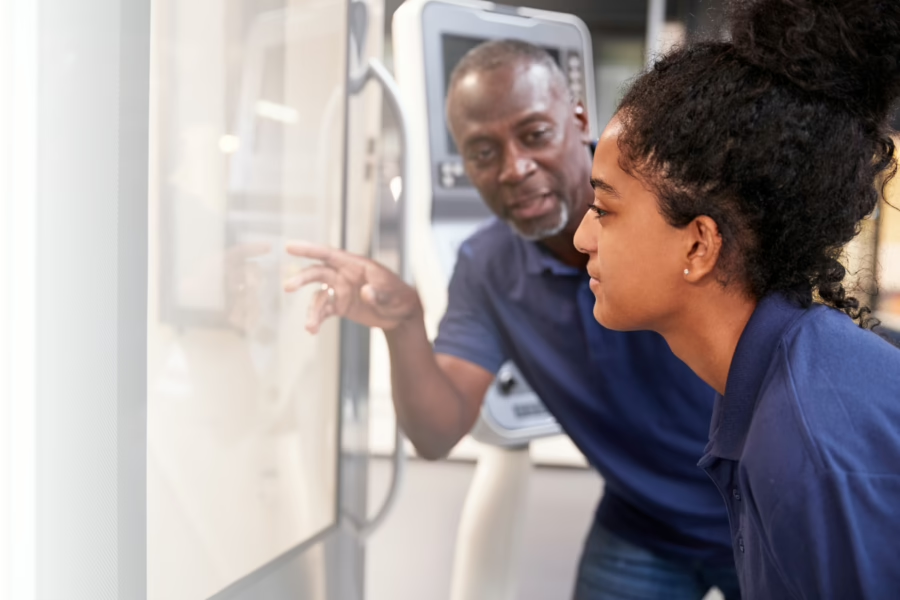What does it take to build a strong water workforce that supports economic opportunity and wealth-building in cities across the US? For the US Water Alliance’s Water Equity Network, the answer starts with listening to the voices of those most affected. In late 2023, we began reimagining the Water Equity Network’s offerings based on member feedback. A clear theme emerged: members desire to make real, local progress on water equity, supported by Alliance staff and peers. When we asked which issues mattered most to their communities, three priorities stood out: affordability, workforce, and partnerships. In response, we launched three Water Equity Network Action Taskforces focused on these topics, including one on building a strong and equitable water workforce.
Water Workforce Taskforce Summary
In October 2024, teams from communities across the US gathered to launch a two-year effort to co-develop and pilot outcomes-based solutions to address local water utility workforce needs and expand access to family-sustaining careers. Anchored by their local water utility and supported by cross-sector partners from the community, each team committed to participating in the Taskforce as equal partners.
“Community relationship-building is one of the keys to a successful workforce development program,” said Lolita Thompson of the Metropolitan Water Reclamation District of Greater Chicago. This spirit of partnership—utilities and communities working together to understand challenges, identify opportunities, and design solutions—is central to the Taskforce’s approach.
Over the past eight months, six place-based teams from Chicago, Illinois, Little Rock, Arkansas, Pittsburgh, Pennsylvania, Prince George’s and Montgomery Counties, Maryland, Prince William County, Virginia, and Seattle, Washington, have met monthly to explore key workforce strategies, including developing paid career pipelines, engaging youth, and removing barriers to hiring and employment. Through virtual workshops, participants explored examples, insights, and best practices. Following each workshop, teams assessed their local needs and opportunities, then shared their findings in peer exchanges.
For some, the impact has been immediate:
“The insights into the challenges and successes of workforce development programs have been invaluable,” said Sarah Collins of Pittsburgh Water. “Because of this Taskforce, I had the guidance necessary to apply for and receive approval for the first apprenticeship program at Pittsburgh Water. We were also able to launch a robust Careers in Water program aiming to educate and inspire individuals to pursue a career in water.”
Taking Action for a Stronger Water Workforce
Now equipped with new insights and deeper connections across the nation, Taskforce participants are ready to apply what they have learned and strengthen existing workforce programs. As this series of workshops and peer exchanges concludes, community teams are preparing to share their action plans with the rest of the Taskforce, outlining steps they’ll take over the next 14 months and beyond to create a strong and equitable water workforce locally.
Today, we celebrate the dedication each team has shown—their eagerness to learn, commitment to listening, and willingness to build a shared foundation before acting. From the start, participants committed to collaborating with local partners and co-create solutions that reflected both community and utility needs. That spirit of partnership has defined this Taskforce and continues to guide the path forward.
“As we all continue to think and plan together, it seems more likely that we will come up with concrete steps forward,” reflected Robin Schwartz of Duwamish River Community Coalition in Seattle.
Looking Ahead to a Better Tomorrow
Today, as we celebrate the commitment of our Workforce Taskforce teams, we also look ahead to the outcomes they aim to achieve. When asked what they hope to achieve through this Taskforce, participants shared the following vision for the future:

This journey is just the beginning. The work of this Taskforce will lay the foundation for strong partnerships and collaboration that not only builds stronger water utilities but also stronger and more resilient communities. Together, we are making progress toward a more equitable water future.
Thank you to the following organizations participating in our Workforce Taskforce:
- Chicago, IL: Metropolitan Water Reclamation District of Greater Chicago, Chicago City Colleges, Natural Resources Defense Council
- Little Rock, AR: Little Rock Water Reclamation District, Ambitious Girls, Inc.
- Pittsburgh, PA: Pittsburgh Water and Sewer, City of Pittsburgh, Department of City Planning, LandForce PGH, Upstream Pittsburgh, Partner4Work, Riverside Center for Innovation
- Prince William County, VA: Prince William Water, Prince William County Office of Community Safety
- Prince George’s & Montgomery Counties, MD: WSSC Water, Morgan State University
- Seattle, WA: Seattle Public Utilities, Duwamish River Community Coalition, Lake City Collective
Learn more about our Water Equity Network Affordability Taskforce.


